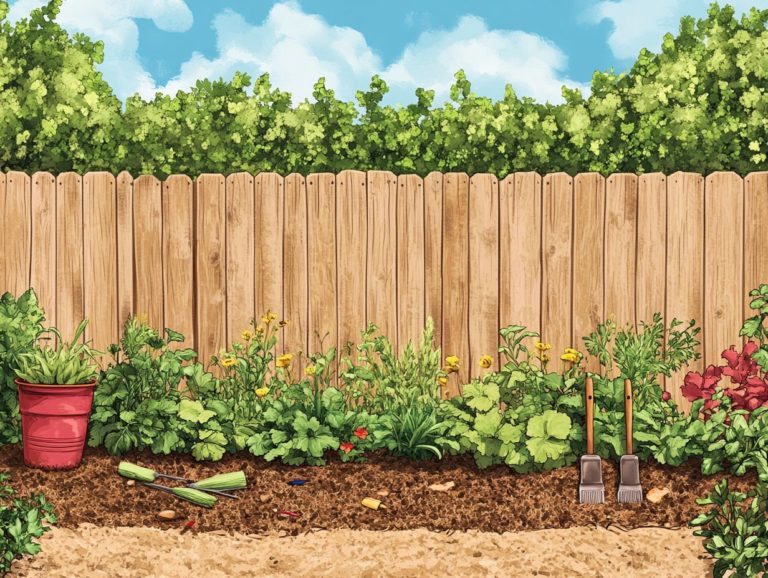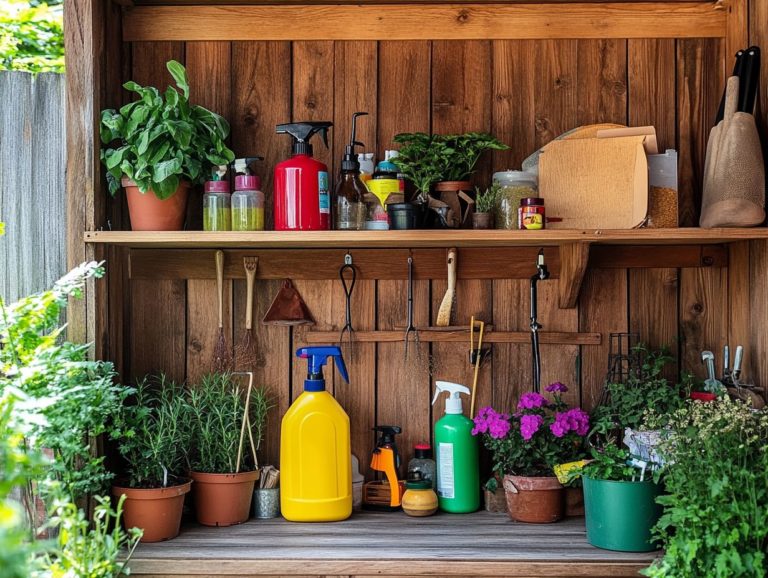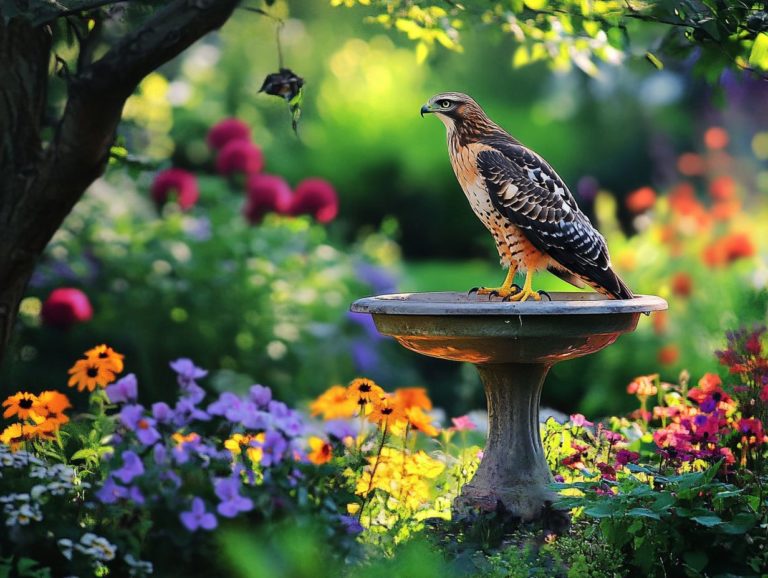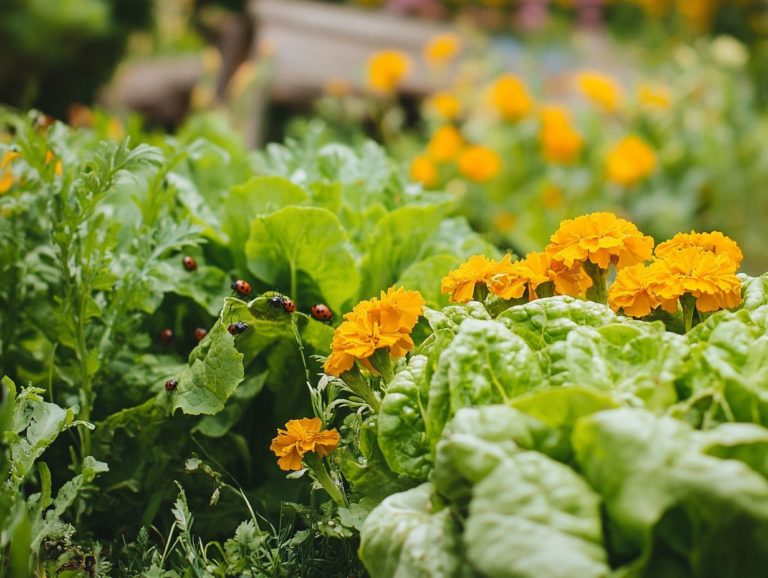5 Essential Steps for Organic Pest Prevention
Pests can wreak havoc in your garden and home! Thankfully, there’s a refined approach to tackling these issues without relying on harsh chemicals.
This article presents five essential steps for organic pest prevention. You’ll learn how to identify the specific pest challenges you face, adopt effective sanitation practices, and leverage natural predators.
Discover the benefits of organic methods, familiarize yourself with common pests, and learn how to create a space that keeps pests away all while protecting your health and the planet.
Contents
- Key Takeaways:
- 1. Identify and Understand the Pest Problem
- 2. Implement Good Sanitation Practices
- 3. Use Natural Predators to Control Pests
- 4. Apply Organic Pest Control Methods
- 5. Regularly Inspect and Monitor for Pests
- What Are the Benefits of Organic Pest Prevention?
- What Are the Common Types of Pests and How Can They Be Prevented Organically?
- What Are Some Natural Remedies for Common Pests?
- How Can a Garden Be Designed to Prevent Pest Infestations?
- What Are the Risks of Using Chemical Pesticides?
- How Can Organic Pest Prevention Help the Environment?
- Frequently Asked Questions
- What are the 5 essential steps for organic pest prevention?
- Why is it important to identify the type of pest?
- What cultural practices help prevent pests?
- What natural pest control methods can be used?
- How does maintaining soil health prevent pests?
- Why is regular monitoring important?
Key Takeaways:

- Identify the pest problem and understand their behavior to effectively prevent and control them.
- Implement good sanitation practices to eliminate food and shelter sources for pests.
- Utilize natural predators such as ladybugs and praying mantises to naturally control pest populations.
1. Identify and Understand the Pest Problem
Understanding your pest problem is key to a thriving organic garden. It helps you identify harmful pests and beneficial insects.
Effective pest identification is crucial for implementing the right organic pest control methods. For gardeners, utilizing 5 simple pest control hacks ensures that your management strategies are tailored to the unique challenges in your garden.
By learning about the life cycles of common pests like aphids and cabbage moths, you can take proactive steps to prevent damage and safeguard your crops.
Recognizing clear signs of pest presence, such as unusual leaf damage or frass from caterpillars, is vital for successful monitoring. You can use techniques like sticky traps or simple visual inspections to keep an eye on pest populations regularly.
Staying vigilant with these practices allows you to catch any surges in pest activity early. This enables timely interventions.
Understanding the various life stages of pests not only optimizes your control measures but also nurtures a thriving ecosystem where beneficial species can flourish. This ultimately cultivates a balanced organic gardening environment.
2. Implement Good Sanitation Practices
Implementing effective sanitation practices in your garden is essential for pest prevention. It minimizes pest presence and promotes healthy soil and robust plant growth.
To achieve this, regularly clear away debris, such as fallen leaves and dead plants. These can become havens for harmful insects and diseases. Cleaning your tools after each use is also crucial to prevent the spread of pathogens.
Proper compost management is equally important. By ensuring your compost is well-aerated and maintained at the right temperature, you encourage beneficial microorganisms to thrive while keeping pests at bay.
These sanitation measures create a balanced ecosystem, enhancing soil fertility and reducing the likelihood of infestations, thereby supporting the overall health of your garden.
3. Use Natural Predators to Control Pests
Utilizing natural predators is one of the most effective strategies for managing pests in your organic garden. Beneficial insects like ladybugs and lacewings provide a sustainable form of natural pest control, limiting pest populations without harmful chemicals.
Beyond these well-known allies, other beneficial insects, such as parasitic wasps and hoverflies, play crucial roles in your garden’s ecosystem. They prey on aphids, caterpillars, and other harmful pests.
Attracting these helpful insects can be easily accomplished through practices like companion planting. Grow specific flowers or herbs alongside your vegetables to create a diverse habitat that appeals to these beneficial species.
Flowers like dill, fennel, and marigolds not only enhance the beauty of your garden but also serve as nectar sources, providing sustenance for adult beneficial insects. By maintaining plant diversity and ensuring blooming plants are always available throughout the growing season, you create an inviting environment for these natural pest control agents to thrive.
4. Apply Organic Pest Control Methods
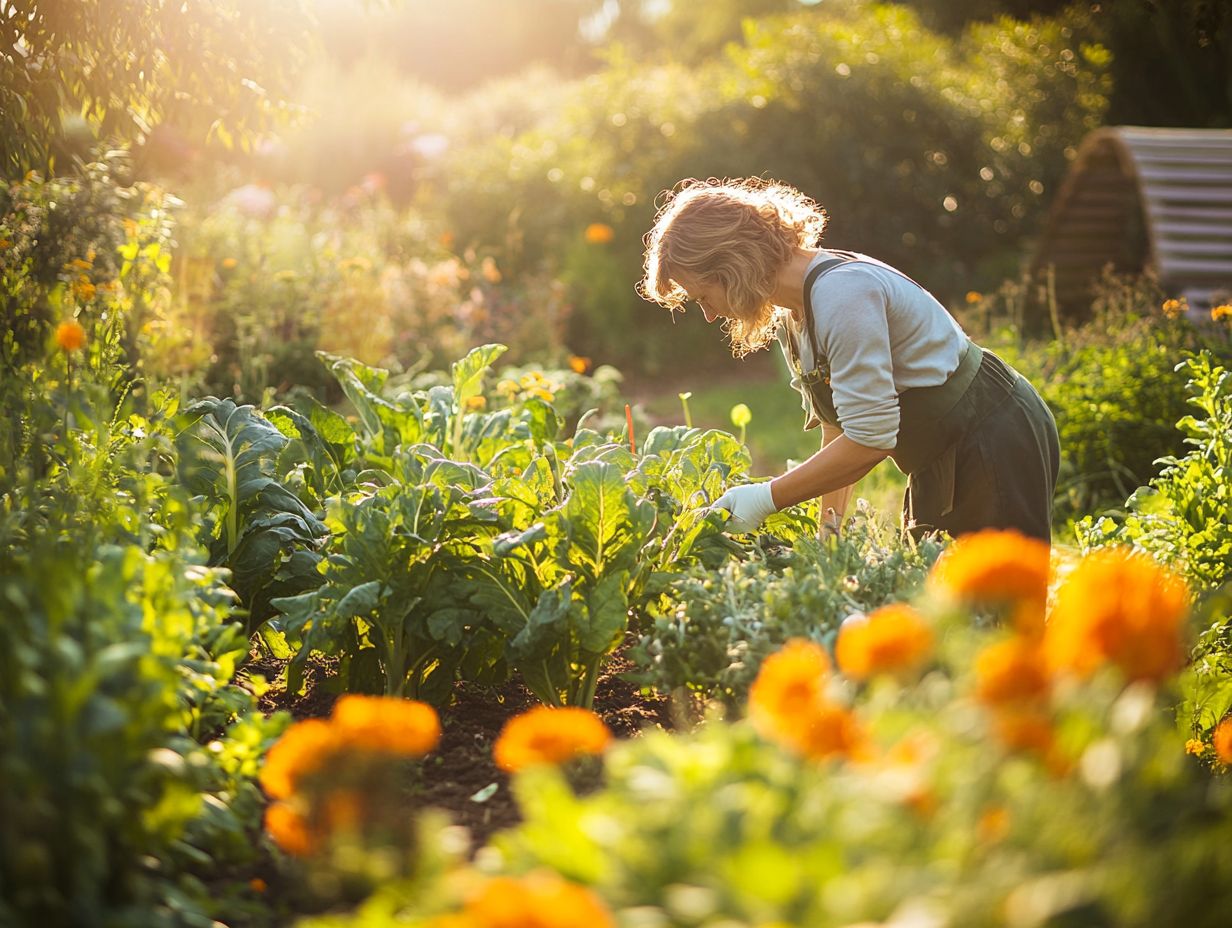
Applying organic pest control methods is essential for growing a thriving organic garden. For effective strategies, consider the top 10 tips for organic pest management, which provide safe alternatives to chemical treatments that may harm beneficial insects and disturb the delicate balance of the ecosystem.
These methods also protect your plants and foster an environment where natural predators can flourish.
Among the arsenal of effective solutions, neem oil truly shines. It disrupts the life cycle of pests while remaining gentle on non-target species (organisms that pest control methods don’t aim to harm). Insecticidal soaps are another valuable ally, specifically targeting soft-bodied insects like aphids and mites. They offer a swift and environmentally friendly remedy.
Then there’s diatomaceous earth, made from fossilized algae, which creates an effective barrier against crawling insects by dehydrating them upon contact. By incorporating these organic products into your garden routine, you can craft a comprehensive pest management strategy that aligns seamlessly with your eco-friendly practices. This approach ensures your garden thrives beautifully.
5. Regularly Inspect and Monitor for Pests
Act fast! Regularly inspecting and monitoring your garden for pests is essential for early identification. This proactive approach helps you catch pest issues before they become a problem.
Along with visual inspections, using traps can effectively gauge pest activity levels. Be thorough during these checks not just looking for visible signs but also paying attention to subtle changes in plant health.
Documenting your findings from these inspections helps you track pest populations over time. This enables you to develop more informed and adaptive management strategies. By keeping a record, you can pinpoint trends, determine the most effective control methods, and ultimately foster a healthier environment for your garden.
What Are the Benefits of Organic Pest Prevention?
Organic pest prevention offers you numerous advantages as a gardener. It promotes healthy plant growth, preserves beneficial insects, and establishes a sustainable gardening ecosystem. For more insights, check out these 5 reasons to choose organic pest management that thrives without resorting to harmful chemicals.
By embracing these natural methods, you ll enjoy improved soil health as organic practices often boost microbial activity and enhance nutrient availability. A garden filled with diverse plant life creates a haven for beneficial organisms, fostering a balanced ecosystem that effectively keeps pest populations in check.
With a reduced reliance on synthetic pesticides, you ll significantly lessen your environmental impact, protecting waterways and promoting better air quality. Ultimately, these practices contribute to long-term sustainability that nourishes not just your garden but also the broader environment, ensuring resilience for generations to come.
What Are the Common Types of Pests and How Can They Be Prevented Organically?
Understanding common pest types like aphids, cabbage moths, and powdery mildew is crucial for creating effective organic pest management strategies that prevent infestations and protect your organic garden.
By identifying these threats early, you can implement tailored solutions to safeguard your plants. For example, aphids those tiny sap-sucking nuisances gather on tender shoots, weakening your plants and potentially spreading diseases. Cabbage moths lay eggs on leafy greens, leading to significant leaf damage as their larvae feast. And let s not overlook powdery mildew; while it s a fungus rather than an insect, it can cloak your leaves in a white, powdery substance, stunting growth dramatically.
Employing methods to manage pests like introducing beneficial insects such as ladybugs for aphid control, using row covers to deter cabbage moths, and ensuring proper air circulation to combat powdery mildew plays a vital role in maintaining a thriving garden environment.
Start using these organic methods today and watch your garden thrive!
What Are Some Natural Remedies for Common Pests?

Natural remedies for common pests can be your secret weapon in protecting your garden while staying true to organic principles. You can utilize methods like homemade sprays, plant extracts, and companion planting to cultivate a balanced ecosystem.
Using these strategies helps protect your plants and supports a healthier environment. For example, a simple spray made from mixing neem oil with water can serve as an excellent deterrent against a variety of insects. Likewise, garlic-based concoctions work wonders in repelling aphids.
Consider integrating plants like marigolds and basil alongside your vegetables; their scents can naturally keep unwanted visitors at bay. These natural approaches enhance your plants’ health and foster biodiversity, which means the variety of different living things in your garden, ensuring your garden thrives in harmony.
How Can a Garden Be Designed to Prevent Pest Infestations?
Designing a garden with pest prevention in mind requires a touch of strategic finesse. Consider changing where you plant different crops each year, plant diversity, and companion planting as your key allies in creating an environment that discourages pest infestations.
By carefully selecting a variety of plants, you can disrupt the life cycles of pests, making it harder for them to settle down. Techniques like interplanting growing different species close together can confuse pests and reduce their ability to find their preferred host plants.
Integrating flowering plants alongside your vegetables not only elevates the garden s visual charm but also invites beneficial insects, such as ladybugs and pollinators, that help keep pest populations in check. Embracing these principles nurtures a more resilient ecosystem, leading to healthier plants and less need for chemical interventions.
What Are the Risks of Using Chemical Pesticides?
The risks associated with using chemical pesticides are significant. They can harm beneficial insects and disrupt the local ecosystem while posing health risks to humans and wildlife. This makes organic pest control not just a safer option but a more sustainable one as well.
Widespread reliance on harsh chemicals threatens water quality, soil health, and the delicate balance of local wildlife. Prolonged exposure to these substances can lead to serious health problems, including respiratory issues.
On the other hand, organic pest control methods like introducing natural predators or employing companion planting minimize these health risks while creating a thriving garden environment. By nurturing biodiversity and promoting soil health, these strategies enhance the resilience of ecosystems and pave the way for a sustainable approach to pest management.
Ultimately, embracing these practices contributes to a safer landscape for you and the planet.
How Can Organic Pest Prevention Help the Environment?
Organic pest prevention is essential for promoting environmental health, playing a pivotal role in sustainable gardening practices. Implementing 5 simple ways to prevent pest infestations can help boost biodiversity, protect water sources, and maintain the overall balance of ecosystems.
By choosing organic methods over synthetic chemicals, you minimize harmful runoff that can pollute rivers and streams while creating safe havens for beneficial wildlife, including pollinators and natural pest predators. These practices encourage a harmonious relationship among organisms, ensuring that both plants and animals flourish together.
This ecological balance is crucial for long-term sustainability, transforming gardens into sources of food and vibrant habitats that support a diverse range of creatures. Embracing pest management strategies for urban gardens is vital for preserving the delicate web of life that sustains our ecosystems.
Frequently Asked Questions

Don’t wait! Start using these natural remedies today to protect your garden and contribute to a healthier planet.
What are the 5 essential steps for organic pest prevention?
The five essential steps for organic pest prevention are: 1) Identify the pest type, 2) Implement cultural practices, 3) Use natural pest control, 4) Maintain soil health, and 5) Regularly monitor your garden, all of which are part of the 5 steps to create a pest-resistant garden.
Why is it important to identify the type of pest?
Identifying the pest type is key. Different pests need different prevention methods, allowing you to target effectively without harming beneficial species.
What cultural practices help prevent pests?
Cultural practices like crop rotation (changing the type of crop grown each season), companion planting, and proper sanitation can deter pests. These tactics disrupt pests life cycles, making it harder for them to thrive.
What natural pest control methods can be used?
Use physical barriers like row covers or hand-picking pests. You can also introduce beneficial insects and apply organic options such as neem oil or diatomaceous earth. Additionally, consider exploring 5 ways to use citrus peels for pest prevention for a natural approach.
How does maintaining soil health prevent pests?
Healthy soil supports strong plants. Strong plants have better defenses against pests, so add compost and organic fertilizers to boost their immunity.
Why is regular monitoring important?
Regular garden checks help you spot pest issues early! Quick action can save your garden from serious damage. Keep your garden healthy by removing weeds and diseased plants.
Start your organic gardening journey today and protect your plants!

